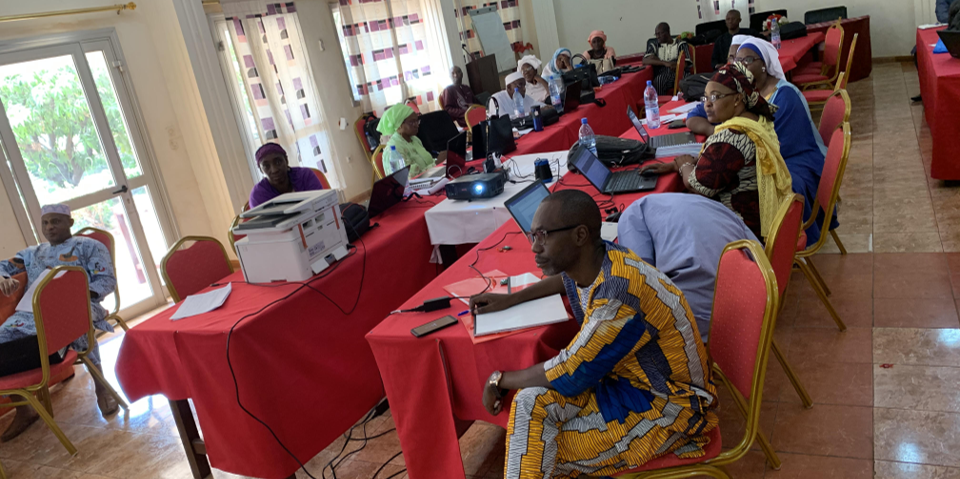Countries and their partners improve malaria data quality in a sustainable way using the MRDQA tool

A country’s national malaria control program (NMCP) needs timely, complete, and accurate data to make informed decisions about malaria control programming and policies. Data quality assessments that provide essential information about data quality and actionable ways to improve it are a key method to facilitate data use for decision making. However, to see changes in data quality over time, data quality assessment tools must be standardized, catered to malaria-specific indicators, and implemented regularly across the health system, and more importantly at points of service delivery. To meet this need, the MEASURE Evaluation project developed the Malaria Routine Data Quality Assessment (MRDQA) tool. The PMI Measure Malaria (PMM) project, an associate award of MEASURE Evaluation, has been supporting NMCPs to implement the MRDQA.
The MRDQA is intended to be simple and highly customizable, allowing for any country to apply the tool to its context as part of supportive supervision visits or to use the tool on its own. Since piloting the tool in 2020, PMM has supported 58 implementations of the MRDQA in six project-supported countries. The findings have been regularly used to identify and address data quality issues, from limited use of standardized reporting forms to data duplication and aggregation errors. NMCPs from multiple countries, including Kenya, Liberia, Mali, and Niger, have established the MRDQA as their national standard for malaria data quality assurance.
The Adaptation and Implementation Process
To facilitate the sustainability of malaria data quality assurance practices, the project collaborates with the NMCP to implement a three-pronged approach. First, PMM and the country NMCP collaborate to adapt the tool to the country’s unique context based on factors such as priority malaria indicators and health system structure. The adapted tool is validated by the country NMCP. Next, PMM conducts formal training with central level NMCP staff, subnational staff, and personnel representing implementing partners, which typically culminates in a health facility visit where participants implement the MRDQA for the first time. Then, PMM coordinates with the NMCP and subnational staff to conduct supportive supervision visits, which often present an opportunity for coaching, as well as follow up on action items identified during previous implementations.
Expanding Use of MRDQAs
PMM work is limited to PMI-supported regions, meaning budget and support for country-wide MRDQA implementation is also limited. Recognizing the need to leverage the benefits of the MRDQA in other regions to increase its impact on national malaria data quality, several NMCPs have advocated for other partners and donors to expand the geographic reach of the tool.
- In Côte d’Ivoire, the NMCP independently implemented the MRDQA in 20 non-PMI-supported districts with financial support from the Global Fund. The NMCP’s monitoring and evaluation team later presented how the MRDQA led to data quality improvements at the health facility level across the country, which led the Global Fund to integrate the MRDQA as a core intervention in their next round of funding.
- In Cameroon, after the NMCP demonstrated that data quality was stronger in the PMI-supported regions of the North and Far North compared to the eight Global Fund-supported regions, the Global Fund expressed interest in implementing the tool in the rest of Cameroon. To facilitate this, PMM conducted an online training on the MRDQA for Global Fund staff.
- In Kenya, the Division of National Malaria Program’s buy-in of the MRDQA as a key intervention resulted in them connecting with the Global Fund and other partners, including Amref Health Africa, to implement the tool in areas outside the PMI-supported countries.
MRDQA: A Global Good
These examples indicate that country NMCPs find implementation of MRDQAs can lead to malaria data quality improvements, which ultimately support better decision-making in areas such as resource allocation and programmatic planning. NMCP advocacy to implement MRDQAs independently and with other partners lends credibility among stakeholders who can benefit from implementing the assessments beyond PMI-supported regions. Improvements in malaria data quality and the expansion of MRDQA use documented by PMM indicate that the MRDQA is a global good with long-term usefulness in the fight against malaria.